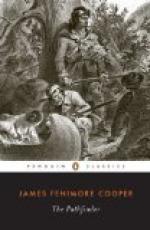For the first ten minutes of the assault, Pathfinder never raised the breech of his rifle from the floor, except when he changed his own position, for he well knew that the bullets of the enemy were thrown away upon the massive logs of the work; and as he had been at the capture of the howitzer he felt certain that the savages had no other shell than the one found in it when the piece was taken. There existed no reason, therefore, to dread the fire of the assailants, except as a casual bullet might find a passage through a loophole. One or two of these accidents did occur, but the balls entered at an angle that deprived them of all chance of doing any injury so long as the Indians kept near the block; and if discharged from a distance, there was scarcely the possibility of one in a hundred’s striking the apertures. But when Pathfinder heard the sound of mocassined feet and the rustling of brush at the foot of the building, he knew that the attempt to build a fire against the logs was about to be renewed. He now summoned Cap from the roof, where, indeed, all the danger had ceased, and directed him to stand in readiness with his water at a hole immediately over the spot assailed.
One less trained than our hero would have been in a hurry to repel this dangerous attempt also, and might have resorted to his means prematurely; not so with Pathfinder. His aim was not only to extinguish the fire, about which he felt little apprehension, but to give the enemy a lesson that would render him wary during the remainder of the night. In order to effect the latter purpose, it became necessary to wait until the light of the intended conflagration should direct his aim, when he well knew that a very slight effort of his skill would suffice. The Iroquois were permitted to collect their heap of dried brush, to pile it against the block, to light it, and to return to their covers without molestation. All that Pathfinder would suffer Cap to do, was to roll a barrel filled with water to the hole immediately over the spot, in readiness to be used at the proper instant. That moment, however, did not arrive, in his judgment, until the blaze illuminated the surrounding bushes, and there had been time for his quick and practised eye to detect the forms of three or four lurking savages, who were watching the progress of the flames, with the cool indifference of men accustomed to look on human misery with apathy. Then, indeed, he spoke.
“Are you ready, friend Cap?” he asked. “The heat begins to strike through the crevices; and although these green logs are not of the fiery natur’ of an ill-tempered man, they may be kindled into a blaze if one provokes them too much. Are you ready with the barrel? See that it has the right cut, and that none of the water is wasted.”
“All ready!” answered Cap, in the manner in which a seaman replies to such a demand.
“Then wait for the word. Never be over-impatient in a critical time, nor fool-risky in a battle. Wait for the word.”




